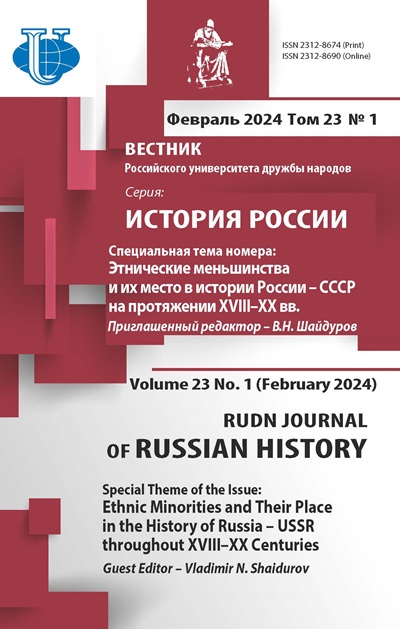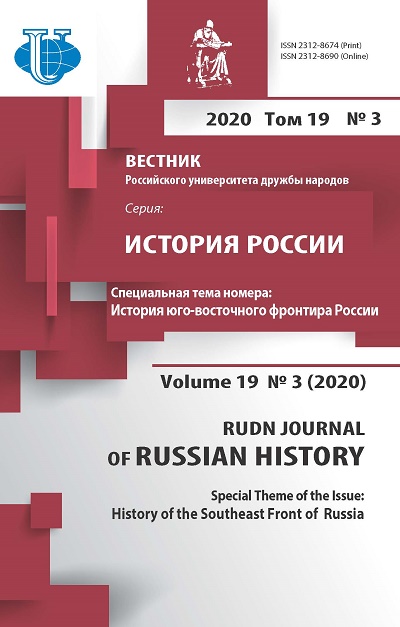The Manchurian Agricultural Society and Attempts to Establish a Colonization Bank in 1914-1915
- Authors: Khodjakov M.V.1
-
Affiliations:
- Saint Petersburg State University
- Issue: Vol 19, No 3 (2020): HISTORY OF THE SOUTHEAST FRONT OF RUSSIA
- Pages: 673-683
- Section: ARTICLES
- URL: https://journals.rudn.ru/russian-history/article/view/24455
- DOI: https://doi.org/10.22363/2312-8674-2020-19-3-673-683
Cite item
Full text / tables, figures
Abstract
Based on materials from the Russian State Historical Archive of the Far East and a number of other sources, the present article examines the activities of the Manchurian Agricultural Society (MAS). Founded in Harbin in 1912, MAS was actively involved in the developing of fertile land along the SinoEastern Railway (Kitaisko-vostochnaia zheleznaya doroga) strip. As the article points out, the leadership of the Company also came up with plans for the colonization of Northern Manchuria, the territory of which belonged to China. So far historians never considered the activities of MAS from this angle; MAS has so far been credited with the role of a conductor of Russian agricultural knowledge, through training specialists for agriculture in Manchuria and offering agro-technical education to the population living along the Sino-East Railway. Until Russia entered the First World War, MAS had some chances of obtaining support for its project in commercial and industrial circles, which were interested in strengthening Russian influence in northeast China. The author notes that serious adjustments in the activities of MAS were due to changes in the international political situation in 1914-1915. Circles in the Russian government were interested in maintaining friendly relations with their eastern neighbors, China and Japan. It is shown that in the changing political environment, without receiving support from the Russian government and the Governor-General of the Amur Province, the Company was able to redirect its activities. Its leadership concentrated on trying to create a special Colonization Society and a subsidizing Colonization Bank, whose funds were to be composed of shares, bonds, and treasury subsidies. The goal of this new Society and the Bank was to support Russia's economic undertakings in the Far East - the organization of agricultural and industrial enterprises, and the provision of financial and technical assistance to them. However, the First World War, which went very badly for Russia, did not allow for a realization of these plans. The problems of the colonization of the region were not resolved.
About the authors
Mikhail V. Khodjakov
Saint Petersburg State University
Author for correspondence.
Email: m.khodyakov@spbu.ru
Doktor Istoricheskikh Nauk [Dr. habil. hist.], Doctor of Historical Sciences,Professor, Head of the Modern History of Russia Department
7/9, Universitetskaya Emb., St. Petersburg, 199034, RussiaReferences
- Beloglazov, G.P. “Nauchno-obrazovatel'naya deyatel'nost' agrarnykh obshchestv v Man'chzhurii v pervoy treti XX stoletiya.” In Obrazovatel'nyy potentsial Tikhookeanskoy Rossii. XVIII–XXI vv. (Vos'myye Krushanovskiye chteniya, 2016 g.), 238–245. Vladivostok: «Dal'nauka» Publ., 2017 (in Russian).
- Denikin, A.I. Russko-kitayskiy vopros. Voyenno-politicheskiy ocherk. Varshava: Ofitserskaya zhizn' Publ., 1908 (in Russian).
- Khodjakov, M.V., and Chzhao, Ch. “Chinese Labor Migration to Russia during the First World War.” Modern History of Russia, no. 1 (2017): 7–30 (in Russian).
- Khodjakov, M.V. “Yellow Russia” of the late 19th – early 20th Centuries in the Geopolitical Plans of the Russian Military Elite.” Modern History of Russia 8, no. 4 (2018): 880–897 (in Russian).
- Khisamutdinov. A.A. “Natural science research of Russian emigrant scientists in North China (first half of the twentieth century).” Vestnik of Far Eastern Branch of Russian Academy of Sciences, no. 1 (2016): 99–107 (in Russian).
- Kuropatkin, A.N. Kitayskiy vopros. St. Petersburg: «Novoye Vremya» Publ., 1913 (in Russian).
- Lukoyanov, I.V. ‘Ne otstat' ot derzhav...’ Rossiya na Dal'nem Vostoke v kontse XIX – nachale XX vv. St. Petersburg: Nestor-Istoriya Publ., 2008 (in Russian).
- Men'shikov, P. “Ob urozhaye khlebov v Kheyluntszyanskoy i Girinskoy provintsiyakh v 1913 g.” Sel'skoye khozyaystvo v Severnoy Man'chzhurii, no. 4–5 (1913): 23–25 (in Russian).
- Poberezhnikov, I.V. “Aziatskaya Rossiya: frontir, modernizatsiya.” Izvestia Ural Federal University Journal. Series 2: Humanities and Arts, no. 4 (2011): 191–203 (in Russian).
- Remnev, A.V., and Suvorova, N.G. Kolonizatsiya Aziatskoy Rossii: imperskiye i natsional'nyye stsenarii vtoroy poloviny XIX – nachala XX veka. Omsk: Nauka Publ., 2013 (in Russian).
- Shilovskiy, M.V. “Geopoliticheskaya znachimost Aziatskoy Rossii dlya Rossii v XVII – nachale XX vv.” In Rossiya mezhdu proshlym i budushchim: istoricheskiy opyt natsional'nogo razvitiya. Materialy Vserossiyskoy nauchnoy konferentsii, 648–653. Yekaterinburg: Institut istorii i arkheologii URO RAN Publ., 2008 (in Russian).
- Subotich, D.I. Zadachi Rossii na Dal'nem Vostoke: pis'mo generala D.I. Suboticha k Voyennomu ministru A.N. Kuropatkinu v 1903 godu. Revel': Revel'skiye izvestiya Publ., 1908 (in Russian).
- Unterberger, P.F. Priamurskiy kray. 1906–1910. St. Petersburg: Tipografiya V.F. Kirshbauma Publ., 1912 (in Russian).
- Yanchenko D.G., Starovoytova Ye.O. Perspektivy ekonomicheskogo razvitiya Kitaysko-Vostochnoy zheleznoy dorogi posle Russko-yaponskoy voyny: regional'nyy aspekt i peterburgskaya politika // Noveyshaya istoriya Rossii. 2018. T. 8. № 3. S. 583–597.
- Zakolodnaya, A.S. “Osnovnyye napravleniya deyatel'nosti Pereselencheskogo Upravleniya na Dal'nem Vostoke Rossii v gody Pervoy mirovoy voyny (1914–1916).” In Vglyadyvayas' v proshloye: Mirovyye voyny XX veka v istorii Dal'nego Vostoka Rossii, 99–119. Vladivostok: Reya Publ., 2015 (in Russian).
- Zinov'yev, V.P. “Sovremennaya istoriografiya khozyaystvennogo osvoyeniya Sibiri v XVIII – nachale XX vv.” In Rol' gosudarstva v khozyaystvennom i sotsiokul'turnom osvoyenii Aziatskoy Rossii XVII – nachala XX veka, 26–34. Novosibirsk: Ripel plyus Publ., 2007 (in Russian).
















